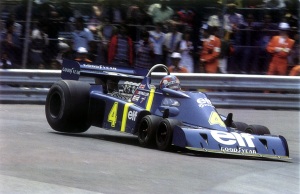The story
The arrival of Derek Gardner at the Tyrrell Formula One team in 1970 as technical director produced a series of outstanding successes. These included Sir Jackie Stewart winning the F1 drivers’ championships in 1971 and 1973, as well as Tyrrell’s triumph in the constructor’s championship in 1973.
The challenge
As Gardner put it, Tyrrell needed a big breakthrough or it would risk being “hopelessly outclassed”. With Ford not undertaking any significant development for its engines, Gardner decided an alternative was to design smaller front wheels, which would reduce lift and increase speed. But this would threaten the car’s grip during turns and its overall stability.
The strategy
Gardner returned to a striking design he had developed before, but not applied, to solve instability problems. The Tyrrell P34, a pioneering six-wheel car with four smaller front wheels and two standard-size rear wheels, improved downforce and grip, and significantly increased the car’s cornering speed.
Persuading Tyrrell’s team and suppliers to support such a radical innovation was a struggle, but the P34 eventually made its jaw-dropping debut in the 1976 season, as the first six-wheel car.
The results
The Tyrrell P34 threatened to dominate F1 – but only for a short period. Four races after its debut, Jodie Scheckter and Patrick Depailler finished first and second in the Swedish Grand Prix. The season ended with Tyrrell coming third in the constructors’ championship, with Scheckter and Depailler third and fourth in the drivers’ championship.
However, Tyrrell had not considered the critical importance of Goodyear, the official tyre supplier for all F1 teams. The tyremaker had agreed to custom-make one “small-size” model for Tyrrell. But it turned out that Goodyear was not prepared to continue development of the size.
For the tyremaker, there were not enough economies of scale because Tyrrell was the only car using small wheels. It judged that the research and development costs were too high to be covered by just one team.
Tyrrell failed to persuade Goodyear that, if the six-wheeler was consistently successful, other teams would adopt the design. The tyremaker was also unconvinced of the wider potential of the design.
While Goodyear worked on improving the standard tyres on all F1 cars throughout the 1976 season, it did not work on development of the bespoke P34 front tyres. As a result, the Tyrrell car’s rear tyres became faster and more durable, while the P34 front tyres did not. The disparity undermined the car’s balance and made it almost undriveable.
In addition, the front brakes suffered overheating problems because of limited ventilation inside the small front wheels.
Eventually, Tyrrell abandoned the P34 project. Scheckter moved to the Wolf F1 team and Gardner – one of the most acclaimed and inventive F1 designers – resigned from Tyrrell and turned his back on F1 for good.
The lesson
Just because an innovation is exciting, it is not guaranteed market success. Tyrrell’s P34 experience confirms the critical importance of strategic suppliers to executing innovative ideas.
In highly technological environments, the outcome of an innovation often depends on several parties’ support and involvement. Businesses must engage with their most important suppliers when innovating.
The six-wheel concept was an effective idea, and although it vanished from F1 – six-wheelers were subsequently banned when the sport introduced more design restrictions – the idea now has several applications, such as all-terrain vehicles, vans, buses, trucks and Covini sports cars. If Tyrrell had persuaded Goodyear to support the P34, we might all be driving cars with two extra wheels today.
